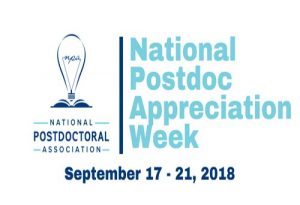The third week of September is a special week for postdocs. As declared by Congress, it is National Postdoctoral Appreciation Week.
Since 2009, the National Postdoctoral Association (NPA) has sponsored this week-long celebration. NPAW grew out of National Postdoc Appreciation Day, which was held on September 24, 2009. In 2010, NPAW culminated with the passage of house resolution 1545 by the U.S. House of Representatives. The resolution, which was passed on September 24, 2010, nationally recognized NPAW. During this time, it is important not only to celebrate the contributions of our postdocs, but also to reflect on the purpose of a postdoctoral appointment.
As defined by the NPA, a postdoctoral scholar (“postdoc”) is an individual holding a doctoral degree who is engaged in a temporary period of mentored research and/or scholarly training for the purpose of acquiring the professional skills needed to pursue a career path of his or her choosing. As we’ve discussed in past years, the key parts of this definition are mentoring and professional growth. One shared need in both of these is receiving useful feedback.
During NPAW, I encourage supervisors and mentors of Postdoctoral Appointees and Argonne Scholars not only to give that much needed show of encouragement and appreciation, but also to be specific in doing so. It is important for people early in their careers not only to know that they are doing a good job, but also, why.
To get to the “why”, consider using a feedback model called SBI. I recently learned of this model while observing the Safety Academy For Excellence (SAFE) training and think it’s worth giving a try. In the SBI feedback model, SBI stands for situation, behavior and impact.
Start the conversation by describing the situation you’d like to address in your feedback. For instance, “the report you submitted for the upcoming DOE review,” or “at the group meeting this week.”
Then refer to the behavior you’d like to address. Continuing with the examples, you might say something like:
“The report you submitted for the upcoming DOE review was well organized, well written and hit all the important points. Nice job!”
Or:
“At the group meeting this week, you asked some good questions.”
Finally, communicate the impact of the behavior. This is the “why”. Knowing the why will reinforce good habits and help your postdoc continue to grow professionally.
Your conversations started above might look something like:
“The report you submitted for the upcoming DOE review was well organized, well written and hit all the important points. Nice job! Our Program Manager will be pleased to see the progress we’ve made without having to search for the information. This will reinforce we are on the right path as a team and help us secure funding.”
Or:
“At the group meeting this week, you asked some good questions. We had not considered the approach you suggested. We may have to rethink a few things, and in the long run, this will save us time and money. We’ll be able to get our publications out sooner and may want to think about generating ideas for the next proposal.”
Pats on the back are great, don’t get me wrong. Knowing why you are getting the pat on the back can add greater meaning and boost confidence. Try it out and let us know how it goes!


